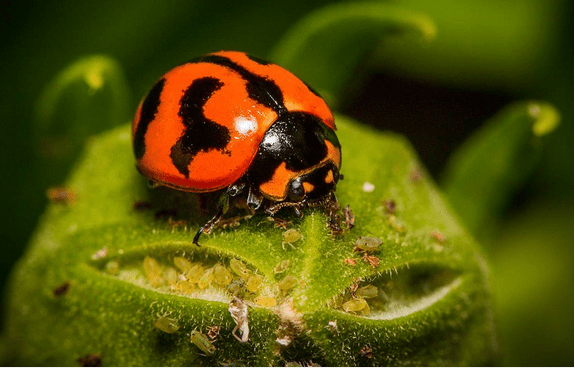There’s a similarity that’s found in aphids, scale, mealybug and whiteflies. It is that they are are all sap-suckers. What’s more? They all release a sweet, sticky liquid that oozes from them as they suck juice from the plants. When this solution lands on the plant, sooty mould takes hold. This ashen-looking fungus does not infect plants, but it blocks the process of photosynthesis. This results in leaf drops and ugly sooty foliage on plant stems, leaves and fruits.
Although common in roses, aphids also attack vegetables such as beans, peas, melons, cucumbers and tomatoes, among others. In addition to sucking, they can also transmit other diseases from plant to plant. Their activities can result in curling and distortion in young foliage, yellowing of leaves and stunted growth in plants.
These soft-bodied insects are about 25mm long and usually wingless and pear-shaped. Depending on the climatic zone, host or species, they can be black, green, grey or milky-cream. They have mouths designed to suck juices from plants.
Aphids’ life cycle is a little different as females give birth to young live and can do so without mating. This they do at a very high rate.
Organic Control
Moist cloth
If you are handling a small area, you can simply use a moist cloth to wipe aphids from plants. This can be time consuming but the results are instant. Do this for two or three days while monitoring the results.
Hose spray
Spray affected plants with a strong jet of water from a hose. Return after a couple of days and see if aphids have left your plants alone. You can then wipe away the soaked aphids or prune the plants.
Attract beneficial insects
This can be done by planting companion plants that attract predators such as ladybirds that can wipe out aphids. Or, easily get organic bio-controls and reduce the time and resources required to attract them to your plants.
Leave ants alone
There is a misconception among many farmers that ants bring aphids to plants. This is not true. In fact, aphids land there first then ants get attracted by the honeydew. That being said, ants are important predators and decomposers in the farm and often drag aphids away.
Do not over-fertilise
Feeding aphid-infested nitrogen-rich fertilisers only increases the aphids’ feed and result in them multiplying.
Weeding
Weed out your ornamental garden or patch frequently to keep aphids away
Pruning
Prune shoots that have been infested by aphids and throw them away.
Would you like to implement an ICM programme? Contact us and we will assist you


